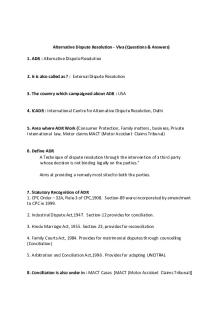Task 3 - ADR vs Court led PDF

| Title | Task 3 - ADR vs Court led |
|---|---|
| Author | Tom TYU |
| Course | Commerce international |
| Institution | Université de Strasbourg |
| Pages | 1 |
| File Size | 46.3 KB |
| File Type | |
| Total Downloads | 29 |
| Total Views | 139 |
Summary
ADR v Court led igjnr fiiozn fnioe iroof...
Description
Task 3: Alternative dispute resolution (ADR) vs a court led process 1
The nature of ADR ADR is a means of resolving disputes through an independent third party who may assist the disputing parties to identify an appropriate solution but who cannot impose a solution on the parties. ADR is a voluntary process from which the parties are entitled to withdraw prior to resolution of the dispute.
1.1
1.2
2
Advantages of ADR (i)
Can be a cost saving option for the parties.
(ii)
Can be faster than a court led process in bringing an end to a dispute.
(iii)
Can enable settlement of a dispute whilst preserving commercial relationships and market reputation.
(iv)
Can provide the parties with a wider and more flexible range of settlement solutions.
Disadvantages of ADR (i)
Non-binding – generally a party cannot be forced to resolve a dispute by any form of ADR against their will. Most ADR agreements allow any party to withdraw even once the process has begun.
(ii)
Enforceability – awards are not as easy to enforce as court judgments. It is standard practice in some forms of ADR to provide that no agreement will be binding on the parties unless it is documented and signed.
(iii)
Absence of disclosure – there is no equivalent of the disclosure process seen in court led processes where parties share relevant information in relation to a dispute. This means disputes may be resolved in the absence of all the information and potentially lead to a wrong decision.
(iv)
Not appropriate in all cases – ADR cannot be used to obtain an injunction or security for costs, neither can it be used in the absence of a dispute e.g. a simple debt collection matter, nor where the client needs a ruling on a point of law.
The court led process Many of the advantages and disadvantages of ADR set out above are the corresponding disadvantages and advantages of the court led process. The court led process is advantageous in that court judgments and orders are ultimately binding on the parties concerned and enforcement is generally easier. To the extent that the disputing parties are non-cooperative with each other and relations are at point where mutual agreement on a solution is unlikely, the court led process may represent a faster and cheaper option than pursuing a method of ADR in vain only to have to set out on the court led approach later.
1...
Similar Free PDFs

Task 3 - ADR vs Court led
- 1 Pages

ADR vs JDR - Detailed.
- 15 Pages

Court Observation Task
- 7 Pages

ADR QUIZ 3 - Quiz 3
- 2 Pages

ADR
- 10 Pages

Task 3 - Task 3
- 2 Pages

ADR Viva QS - ADR VIVA
- 7 Pages

KCM1 - Task 3 - Task 3
- 7 Pages

C820 task 3 - task 3
- 3 Pages

C572 - Task 3 - Task 3
- 8 Pages

C489 Task 3 - Task 3
- 6 Pages

C820 Task 3 - Task 3
- 4 Pages

D093 task 3 - TASK 3
- 5 Pages
Popular Institutions
- Tinajero National High School - Annex
- Politeknik Caltex Riau
- Yokohama City University
- SGT University
- University of Al-Qadisiyah
- Divine Word College of Vigan
- Techniek College Rotterdam
- Universidade de Santiago
- Universiti Teknologi MARA Cawangan Johor Kampus Pasir Gudang
- Poltekkes Kemenkes Yogyakarta
- Baguio City National High School
- Colegio san marcos
- preparatoria uno
- Centro de Bachillerato Tecnológico Industrial y de Servicios No. 107
- Dalian Maritime University
- Quang Trung Secondary School
- Colegio Tecnológico en Informática
- Corporación Regional de Educación Superior
- Grupo CEDVA
- Dar Al Uloom University
- Centro de Estudios Preuniversitarios de la Universidad Nacional de Ingeniería
- 上智大学
- Aakash International School, Nuna Majara
- San Felipe Neri Catholic School
- Kang Chiao International School - New Taipei City
- Misamis Occidental National High School
- Institución Educativa Escuela Normal Juan Ladrilleros
- Kolehiyo ng Pantukan
- Batanes State College
- Instituto Continental
- Sekolah Menengah Kejuruan Kesehatan Kaltara (Tarakan)
- Colegio de La Inmaculada Concepcion - Cebu


